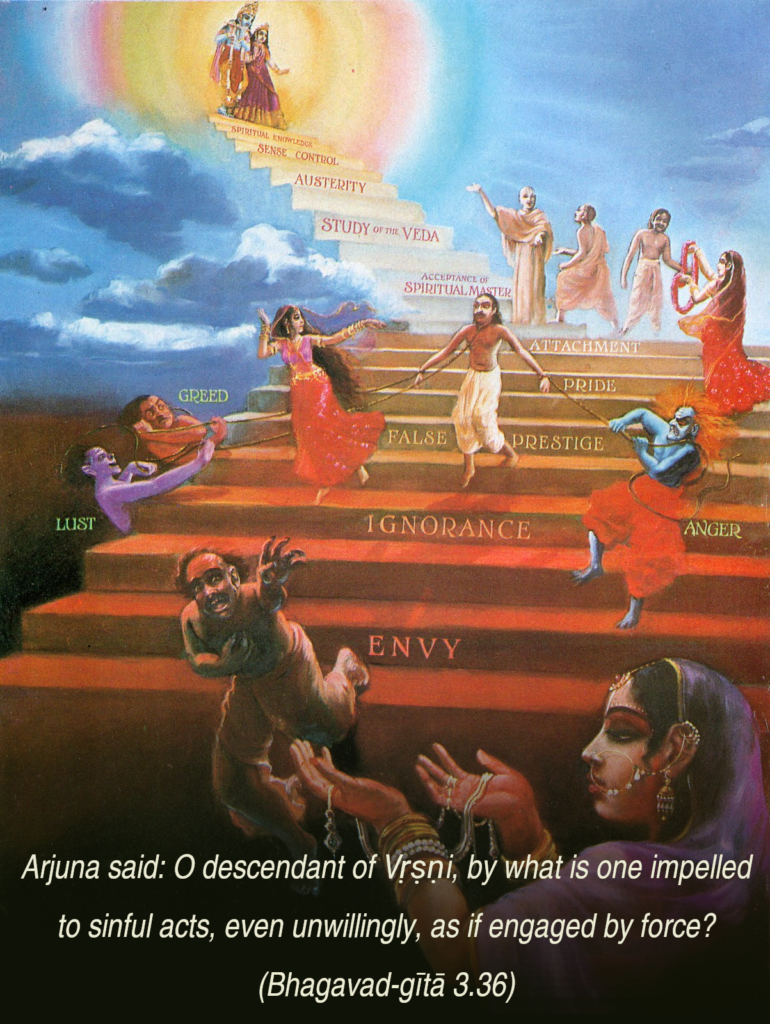अर्जुन उवाच |
अथ केन प्रयुक्तोऽयं पापं चरति पूरुष: |
अनिच्छन्नपि वार्ष्णेय बलादिव नियोजित: || 36||
arjuna uvācha
atha kena prayukto ’yaṁ pāpaṁ charati pūruṣhaḥ
anichchhann api vārṣhṇeya balād iva niyojitaḥ
arjunaḥ uvācha—Arjun said; atha—then; kena—by what; prayuktaḥ—impelled; ayam—one; pāpam—sins; charati—commit; pūruṣhaḥ—a person; anichchhan—unwillingly; api—even; vārṣhṇeya—he who belongs to the Vrishni clan, Shree Krishna; balāt—by force; iva—as if; niyojitaḥ—engaged
Translation:
Arjuna said: O Krishna! Constrained by force as it were, by what does man commit sin even against his wish?
Commentary:
As the Lord continued his teaching about restraining the senses, overcoming Raga and Dvesha, and discharging one’s duty, Arjuna was seized with a deep doubt about the mysterious force that seems to compel man into evil in spite of his effort to avoid it. Such a doubt will naturally occur to every seeker and so the question and the Lord’s answer are of the greatest importance to mankind.
Who does not know that indulgence in sense-pleasures is a mental slavery’ Who does not know that anger, spite, envy and pride are wrong mental attitudes? And most of the people yield to them even against their wish. No one desires to do evil or commit sin and yet some mysterious force seems to drive mankind into evil and sinful ways of life. What is that mysterious power? Where does it abide? How can it be counteracted; These things are essential for all seekers to know.
One should have a clear understanding of the cause and source of evil, and then only can its activity be neutralised. There are some plants that persist in sprouting up again and again, though the stem is cut off repeatedly. If the roots are pulled out and destroyed, there is no further danger of their growth. So the cause of the sin should be known, and if the cause is removed, the resulting evil would not be there.
The force of evil is in man himself. It is this power that drives man to do evil, though he knows that it is evil, and though he desires to avoid it. The Lord explains the nature of this mysterious force from the next verse onwards.
There are three types of individuals – (1) those who are free from evil (2) those who do not wish to do evil, and yet are under its sway, (3) those who do evil knowing it to be such. The first are Jivanmukthas, rare men who have crossed the ocean of samsara. The tricks and subterfuges of Maya cannot betray them into evil at any time and for any reason. The second type of men are sincere seekers. Arjuna’s question is from the standpoint of this type of men. The third type of men are evil-minded, sinful, plunged in darkness, reveling in sensuality, and embodying all that is hateful and self-destructive.
The root of this sin is desire, for worldly pleasures and prosperity. But a man does not give any heed to this desire, and so he is unable to know the root of evils (sins). He understands that he wants to abstain from committing sins, but some entity is forcibly engaging him, in sins. Duryodhana also declares:—
जानामि धर्मं न च मे प्रवृत्तिः
जानाम्यधर्मं न च मे निवृत्तिः।
केनापि देवेन हृदि स्थितेन
यथा नियुक्तोस्मि तथा करोमि॥
“I know what is righteousness, but I am not inclined to it; I also know what is unrighteousness, but I cannot get rid of it. There is some ‘deva’ (force) in my heart, which drives me to act” (Garga-Samhita, Asvamedha. 50/ 36).
The term ‘deva’ used by Duryodhana stands for desire, (for pleasure and prosperity) which forces him to commit sin, and not to follow righteousness. The expression ‘Kena prayukto’yam papam carati’— also shows that he is impelled to commit sin by some other force.
This shloka depicts the gap between “Knowledge” and “Application”.(or the Gap between Knowing and Becoming)
This shows one of the main differences between Duryodhana and Arjuna’s attitude. Duryodhana merely made a statement admitting the problem, seeking no way to correct it. But Arjuna actually questioned the problem, asking Krishna for help.
In the modern context, I think one of the most reasonable learning from this is – merely admitting that there is a problem is not sufficient to solve the problem. We need to know and question the problem to find a solution.
Related Articles:
- Bhagavad Gita: Chapter 3, Verse 5
- Bhagavad Gita: Chapter 3, Verse 27
- Bhagavad Gita: Chapter 18, Verse 59
